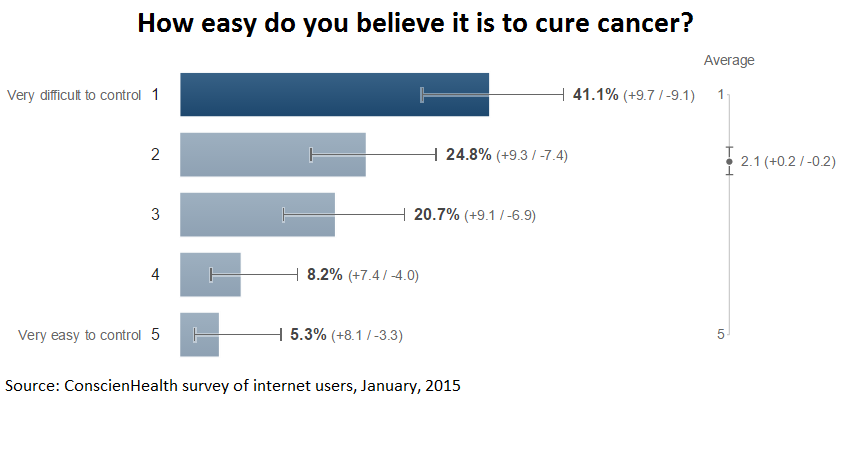
Obesity, Cancer, and AIDS
Obesity sits atop the list of diseases that Americans worry about. (We’ll set aside the matter of Ebola for now.) And yet people have a hard time wrapping their heads around obesity as a disease. Some equate obesity with BMI or body size and protest that BMI can’t be a disease. Others say obesity is just evidence of bad behavior, not a disease. But if you really want to figure out what kind of disease obesity is, it’s worth contrasting obesity, cancer, and AIDS.
These are all diseases that — to varying degrees over time — have instilled fear and concern in the public.
Before obesity became the top health concern of Americans, AIDS was. When it burst onto the scene, it was poorly understood and the ignorance about the disease led to devastating bias and discrimination. Sound familiar?
Beginning in the 1980s, AIDS was the disease of most concern to Americans until the virus that caused it was discovered and brought under control. A social movement to counter discrimination against the LGBT community played a role.
Cancer replaced AIDS as the disease of greatest concern in 2000. Then in 2008, obesity replace cancer. Like cancer, obesity is not just one disease because it has many different forms. You’ll hear scientists call them “phenotypes.” Just like cancer, obesity is caused by many different factors. In contrast, a single virus causes AIDS.
 People feel like it’s easier to cure obesity than cancer, even though it really isn’t. For specific types of cancer, good treatment with full remission is possible. For other types, the outlook is not so good. Some people with obesity achieve remarkable, lasting results — most often through surgery, but also through intensive diet and exercise regimens. More often, people experience relative improvements and then struggle with obesity as chronic disease, constantly concerned about the possibility of relapse. In contrast, HIV has become a manageable chronic disease,
People feel like it’s easier to cure obesity than cancer, even though it really isn’t. For specific types of cancer, good treatment with full remission is possible. For other types, the outlook is not so good. Some people with obesity achieve remarkable, lasting results — most often through surgery, but also through intensive diet and exercise regimens. More often, people experience relative improvements and then struggle with obesity as chronic disease, constantly concerned about the possibility of relapse. In contrast, HIV has become a manageable chronic disease,  with straightforward, effective treatment regimens.
with straightforward, effective treatment regimens.
What lies ahead for the treatment and prevention of obesity could very well follow the path of cancer. Scientists and clinicians are working hard to understand the fundamental biological mechanisms of this chronic disease. They are working to sort out different types of obesity and the treatment strategies that work best for different people. The range of tools for treatment is slowly expanding.
The only stumbling block is bias that sometimes blinds us to the complexity of the health problems that obesity presents.
Click here to read the latest Gallup survey of U.S. health concerns.
The Sick Child II, pastel by Edvard Munch
Subscribe by email to follow the accumulating evidence and observations that shape our view of health, obesity, and policy.

January 10, 2015 at 1:03 pm, Alexa Fleckenstein M.D. said:
It is only difficult to cure obesity if one insists on eating one’s cake at the same time! If one embarks on a diet of fresh foods and goes for a walk every day, one already is on the right way. Only a society that needs us as consumers will want us to keep on eating dairy, sugars, sweeteners, trans-fats, meats from sick animals, processed foods, and so on.
January 10, 2015 at 6:19 pm, Ted said:
Thanks for taking the time to comment, Alexa.
Following a diet of fresh foods and taking a walk every day will certainly result in better health for someone who isn’t already doing those things. But numerous studies have shown that it won’t reliably cure obesity. I only wish it were true.